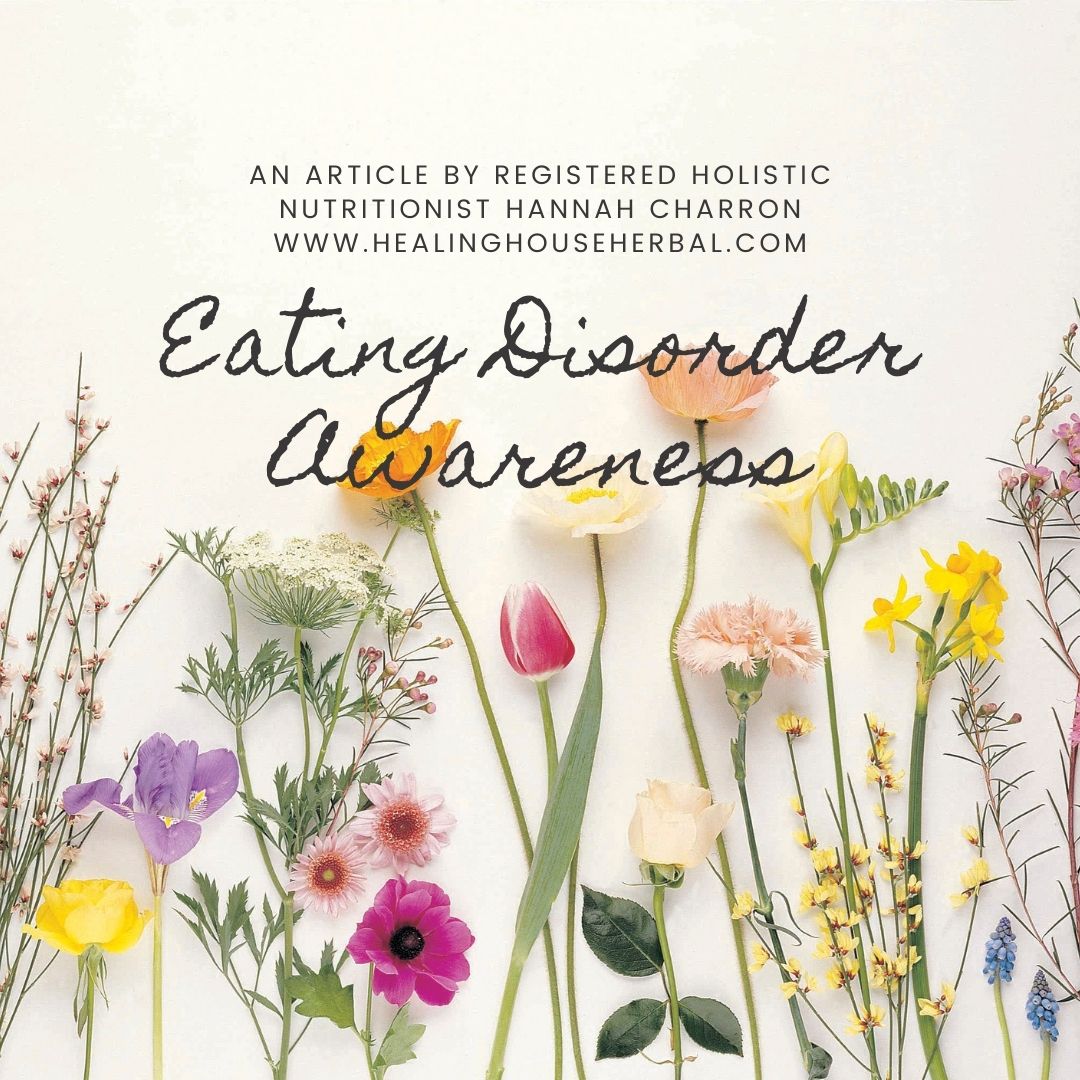|
Disordered eating usually has a strong psychological component with triggers that range from person to person. All forms of under eating, with lack of macro and micronutrients, leads to nutrient depletion with more health concerns to follow over time.
In the following article, learn about the impact of eating disorders from a physical/physiological point of context. If you or anyone you know struggles with eating disorders, please seek help. Eating disorders are a multi faceted illness that require medical attention from a medical practitioner, support services from counselling, and potentially natural support from nutritionists and herbal medicine experts - having a health team to see you through, is better than going alone. If you need immediate help, there are crisis options available with hotlines. For Canada please go to https://nedic.ca/ For the US please try https://www.nationaleatingdisorders.org/ Hormonal imbalance Because eating disorders are extremely psychological, they easily ramp up the production of our stress hormones. This is heavily taxing on the body as a whole and especially the adrenal glands, which are responsible for producing quite a bit of our sex hormones. Adrenal stress disrupts the production of estrogen, progesterone and testosterone, all of which play a role in reproductive health including regular menstruation, libido and fertility. Women have the tendency to lose their cycle all together (amenorrhea) leading to very low sex drive and inability to conceive, while men suffer from erectile dysfunction. This is the struggling body’s way of saving energy, and any concerns related to disorded eating may return back to health once eating is again balanced. Sadly, disordered eating affects higher percentages of young adults who are meant to be in the highest point of their sexual & generative time, thus creating complications for both the mother and / or baby during pregnancy, or unfortunately the inability to reproduce. Blood sugar imbalance & insulin resistance With undereating, sometimes comes overeating / binging. These drastic patterns have a negative effect on blood sugar and insulin balance. With going from one extreme to the next, blood sugar levels drop, and spike quicker than the body would admire. These crashes often lead to fatigue, irritability, anxiety, depression & other symptoms. Commonly, caffeine or refined foods are craved in order to boost energy, which additionally disrupts production of serotonin & melatonin. These habits only enable the vicious circle, carrying on any blood sugar imbalance, leading to possible insulin resistance and further complications such as diabetes, heart conditions, nerve damage, mood disorders, eye problems & more. Neurotransmitter imbalances Dieting or restricting has been shown to decrease levels of tryptophan, which makes serotonin. Serotonin is a neurotransmitter & happy hormone that stabilizes mood, promotes good sleep, controls carbohydrate intake and manages compulsive & obsessive behaviours. Binging may occur which gives a temporarily relief of stress from a need in caloric intake but is usually followed by more restriction and possible bulimic tendencies, which again depletes the system of tryptophan & other nutrients needed to form serotonin through the act of vomiting. Mood disorders or traits such as depression, anxiety, impulsiveness, irritability and swings tend to arise. Additionally, with low estrogen being common in disorded eating and also being shown to lower serotonin levels, there is no doubt that issues with mood and mental health with occur. Deficiency in essential fatty acids (EFA’s) Fat phobia is typical in eating disorders. Due to a low-fat diet, depression and irritability come up as essential fatty acids are key in brain function, as well as sex & stress hormone production. Furthermore, with fat missing from the diet, blood sugar levels drop quickly and create imbalances. Gastrointestinal disturbances Some forms of disordered eating consist of the consumption of nutrient poor foods high in sugar and refined carbohydrates. With this in mind, we can address symptoms like bloating, constipation, the opposite of constipation, slow gastric emptying, gas and malabsorption. Malabsorption is important to review as any nutrients that the person may be getting are not actually being absorbed and used in the body where needed, which can also lead to further emotional symptoms. Without chemical reactions occurring as they should, the hormones that control hunger and satiation may also be impaired. Food allergies & intolerances Coming off of the last point, if the only foods being consumed consists of empty calorie foods with no nutrients, serotonin production is affected negatively, more stress is put on the adrenal glands and blood sugar increases. Processed foods such as refined sugars and carbohydrates get in the way of neurotransmitter functions as well as any nutrient absorption that becomes available. This will all alter mood and state of mind. There have also been studies showing that food allergies and intolerances may be a contributing underlying factor to mental health issues and conditions such as disordered eating. Impaired bone health Reduced calorie & nutrient intake, plus exercise stress & low energy availability can cause amenorrhea as discussed. With reduced circulating estrogen, there is enhanced bone resorption, which then leads to reduced bone mineral density & increases the risk of osteoporosis. Nutritional support: While disordered eating is hugely related to mental health conditions, nutritional counselling may be used depending on the case as a multi-disciplinary approach in tandem with psychological support. We are whole, with the gut and brain being extremely connected, thus intertwining nutritional approaches with proper psychological treatment is of best interest and holds greater success rates in recovery. Healthy & essential fats to support hormones, adrenals, thyroid, blood sugar & brain health. Rich omega 3 rich foods such as cold-water fish like salmon, halibut, herring, sardines, mackerel, cod, tuna and anchovies, as well as in hemp seeds, chia seeds, flax seeds and / or oil, avocado and / or oil & olive oil. Maca root to support adrenals, energy and sexual health. Found in both capsules and powered form. Zinc deficiency may contribute to eating disorders and is likely depleted with food restriction and malabsorption. Supplementation of zinc through capsules or food sources such as oysters, legumes, nuts & seeds, organic eggs, red meat and unprocessed whole grains can support those suffering eating disorders, along with women’s and men’s sexual & reproductive health. Electrolytes are significant when it comes to disordered eating patterns. Dehydration doesn’t just occur from lack of water intake, as a large percentage of hydration comes from solid foods and with restriction one can become more susceptible. Electrolytes such as sodium, potassium, calcium, magnesium and chloride are essential for our bodies to function properly. Restrictive eating, stress and anxiety depletes optimal levels, and especially in those suffering from bulimia as the body is losing electrolytes through vomiting, sweating and even laxative induced bowl movements. Isotonic solutions contain electrolyte balances similar to the plasma of our bloodstream. Some good options for these products include Electrolyte Synergy by Designs for Health & Electrolyte Drink Mixes by Ultima. Alternatively, you can play around with making your own:
Sodium found in sea salt, pickled foods and organic fermented foods such as miso or tempeh Calcium in organic unpasteurized cheeses, organic soy products & peas, lentils, almonds, poppy seeds coconut milk, wild caught salmon & kale Potassium sourced from bananas, oranges, spinach, broccoli, sweet & russet potato as well as some dried fruits such as prunes & dates Chloride from many vegetables as well as seaweed, tomatoes, lettuce, celery & olives Magnesium sources include cacao, avocado, most greens, nuts & seeds, beans & unprocessed whole grains *vegetables & fruits contain many if not all electrolyte minerals Iodine to support thyroid health. Thyroid disorders are extremely common here and contribute to further hormonal imbalances. Food sources high in iodine include sea vegetables, seafood and iodized salt. Additionally, saturated fats have shown improvement in thyroid function, and can be found in organic coconut oil, ghee, butter, unpasteurised full-fat dairy, and organic red meats. Intestinal support is key in most circumstances. Including the following will help bring balance back to the gut microbiome, aid digestion, improve absorption and lead to better mental health. Our gut flora also regulates adrenal, thyroid and liver function. The state of our gut bacteria plays a massive part in mood stabilization & sleep quality, which in turn will reduce stress on the adrenals. Probiotics found in fermented foods like sauerkraut, kombucha and kimchi, probiotic supplements, cultured dairy products. Prebiotics in legumes, garlic, onions, dairy products, apples, grapefruit, sweet potatoes, quinoa, cauliflower, kale, blueberries. Fibre from sweet potatoes, lentils, quinoa, flax, greens, and beans. Liver Support as it is a key organ for hormone balance and cholesterol production, which is the building block for the hormone’s estrogen, testosterone, and progesterone, as well as cortisol, our stress hormone. Indole-3-Carbinole found in cruciferous vegetables like broccoli, cabbage, cauliflower, kale, brussels sprouts and mustard greens. Calcium D-glucarate found in apples, grapefruit, garlic, onions, and bitter greens like mustard greens or collards. Balancing blood sugar through eating frequent and balanced meals will stabilize blood sugar levels and take stress off the adrenals. Quality protein, as well as healthy fats, will help slow the digestion of glucose, thus avoiding spikes & crashes and the symptoms that come along with it. Optimal protein sources include organic & pastured meats, eggs, wild caught food of the sea, organic soy products and plant based combinations such as whole grains and legumes. We are all biochemically unique, so working with a professional would be a good option in order to discover your ideal protein intake. As you can see from all of the information above, the physical impacts of disordered eating are great and encompass many systems. You were also able to see some of the herbs and supplements often used when working with an individual who is struggling with disordered eating. If you would like to speak with me 1:1 about concerns with disordered eating, please contact the office directly to make an appointment, we are here for you. In health and wellness, Hannah Charron - Registered Holistic Nutritionist
0 Comments
Leave a Reply. |
Petra Sovcov is not a Medical Doctor (MD) nor a Naturopath (ND), she is a Clinical Herbal Therapist (CHT) and holds a Doctorate in Natural Medicine (DNM). The suggestions or recommendations made on this site are not meant to be a substitute for advice from your MD, or as a substitute for any prescriptions you may be taking. Suggestions followed will be the responsibility of the reader, and are stated with the intention of interest and education only. If you have a health issue, please see your primary care physician (MD) first and foremost. Categories
All
Archives
July 2024
|


 RSS Feed
RSS Feed